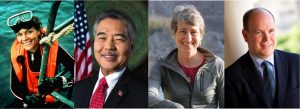IUCN World Conservation Congress: Planet at the Crossroads
Posted on Jul 27, 2016 in Main
“IUCN is the world’s oldest and largest global conservation network,” said Governor Ige. “It can drive policy and provide a catalyst for local and worldwide change.” Sometimes called “the Olympics of conservation,” the Congress meets every four years to find answers to the most pressing environmental challenges.
The good news for the public is that everyday citizens can experience the Congress at various levels and costs. Free exhibit pavilions on the first floor of the convention center will be open Sept. 2 – 7 and Sept. 9 from 11 a.m. to 5 p.m. For youth and kamaʻāina who want to participate in workshops, “knowledge cafes” and poster sessions, there are discounted registration fees and local kamaʻāina day passes. For details, go to iucnworldconservationcongress.org.
In addition, Maui County will present the first Indigenous Crop Biodiversity Festival, Aug. 24 -30 with activities on Maui, Moloka‘i and even Kaho‘olawe. The festival will feature talks, tours and workshops on everything from indigenous Hawaiian foods, species and habitat preservation to food security and renewable energy. For more details, visit ICBF-Maui.com.
The choice of Hawai‘i to host the Congress is iconic. “Hawai‘i and other island communities are on the front lines of climate change and conservation issues,” said Suzanne Case, director of the Department of Land and Natural Resources. “We can take everything we’ve learned about how to protect what makes Hawai‘i special and share that with people all over the world. The best outcome would be Hawai‘i and our planet make a big leap forward in caring for our environment.”
Randy Tanaka, executive director of Hawai‘i’s host committee, added, “This is our moment to be in the world spotlight. As an island community we’re all in the same canoe, and the driving force is our Hawaiian culture. We have a chance to do something in this generation to help the next generation. That’s what it’s all about.”
Photo: IUCN speakers
Read more in our August issue.